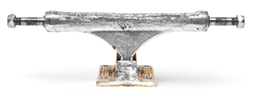
Photography: John Paz.
For close to two decades, the Brighton born Amir Williams was a firm fixture of the U.K. skate scene. Like many that initially established themselves in the pre-social media age, Amir was dedicated to working on video parts, racking up photos, and being present at any event he could make his way to, and throughout his many years on a board, he has laid claim to no shortage of tricks around Brighton (and further afield) that have become the stuff of legend. Then, at the age of 39, Amir began suffering with a hereditary eye disease, quickly resulting in the loss of sight in his left eye, and inconsistent vision in his right. Never one to shy away from a challenge, Amir is determined to stay positive, and remain active on a board for as long as he physically can. For the first revived Consultation feature, we decided to catch up with Amir to hear about his experiences with corneal dystrophy, and the turns his journey has taken over recent years as a result.
For the sake of the uninitiated, please can you introduce yourself?
My name is Amir Williams, I currently live in Brighton, and I turn 44 at the end of May. I’ve been skating since I was eight years old, so I suppose you could say I’ve been skating all of my life, pretty much. It feels like I’ve disappeared lately, entered the Twilight Zone, because I have inherited an eye disease called corneal dystrophy. In a nutshell, I’m completely blind in my left eye, and eventually I will go blind in my right eye too, but no one knows when.
Can you explain to us what corneal dystrophy is? Without getting too technical, it starts out as obscured vision, right?
The corneal dystrophy I have is more common in people from Africa. My grandad was Black, and it has been passed down from him, though it skipped a generation and came straight to me. With the left eye, I thought it was an infection. Say I looked at a street light, it would look like there was a cobweb over it; everything was just a little bit cloudy, and for years I just put up with that. Back when we’d be shooting stuff for Sidewalk, I had it then, but I just thought my eyelashes were too long or something (laughs).
So you put up with obscured vision for years, but was there a point where you decided you needed to seek proper help? Did things keep getting worse?
I think I was maybe 39. It came along when I felt like I was doing well in skateboarding, for myself. I was in Asia, and I was skating every day, man. I was teaching English, skating, teaching skating, entering comps… I was doing so much. My grandfather had a stroke; I had a phone call one day to say he’d had a stroke, and I got a flight home the next day to see him. He passed away a few months after that, then my eyesight went, almost at once. I was skating the DIY at the marina, and I thought my eye was just irritated by the dirt and dust. I had this pain in my eye, so I went to the hospital, and they explained, “we’re going to sort it out, we just need to operate”, and I woke up blind in my left eye. They had to cut a hole out of my eye, cut out the infected bit, because they couldn’t risk it spreading to the other eye. They did what they needed to do, I guess.

Locked and loaded frontside 5-0 at The Level.
How did people react when you told them you’d completely lost the vision in your left eye?
People talked to me like I’d got the flu: “you’ll get better soon”. When you’re blind, there’s no ‘getting better soon’ (laughs).
How old was your grandfather when you realised that he was suffering with corneal dystrophy?
He was quite old. I think he started having troubles in his late 60s or early 70s, but if he was suffering, he was never one to tell anyone. He went fully blind in his late 70s, then he passed away at 89.
So you’ve got this quite early then, especially in comparison to your grandad.
Mate, every person in the hospital that’s got the same disease is over 50. The disease I’ve got, they don’t understand it, because it’s an African variant, and no one else in this country is known to have got it. My grandad was the guinea pig when he asked for help, and he said he was going to leave it. He warned me, “don’t go to the hospital, just live with it”. When it started affecting me, I went to the hospital, and now we are where we are. Your cornea covers your whole eye, and I’ve got stitches the whole way around both my eyes. I’ve had seven operations on my left eye, and four on my right, and the pain is horrendous, seriously. It’s like being stabbed with a needle every few seconds.
It sucks for me because I want to do what I want to do, and I’m being held back, but I’m not giving in.
And how did you manage this pain? I’m assuming it’s constant?
Yeah man. For a while I disappeared into the lean and Xanax and Valium world, because of the pain, and because of the changes in my life. I’m not good with change, and I had a lot of changes happen at once, and it all made me feel lost. I lost my grandad, my girlfriend, my eyesight, I couldn’t skate, and I had physical pain from my eye. I experienced a lot of emotions that you’d usually go through over a lifetime, over a month, or two months, and I needed to kill the pain and the emotions that I was going through. I’m off that now, but that was a path I never thought I’d go down, and I’ll never go down again. I can’t blame anybody else for that, it was up to me if I wanted to go down that route, but luckily I came back from there, and I’m completely cleaned out, thanks to a few friends that stood by me all the way. The best drugs are skateboarding with mates, and stacking clips. All I’ve got to do now is get my arm better after I dislocated it recently, take a few slams, and get on with skating.
I’m guessing that after you woke up from the operation being blind in your left eye, skating wasn’t really on your mind?
I had six months where I had to rest, then I started skating and realised that my balance had completely gone. I lost my balance and my confidence. I still tried to skate, but I cracked my head open on a flatbar, trying a front board, then I had to wait for that to heal. I had three more eye operations after that, each one needed six weeks to heal. Now I’m at this point where I’m completely clean of junk, but I just need to wait for my shoulder to heal. I’ve never dislocated my shoulder in my life, but it already feels like it’s getting better, and when it is, I’m going to keep making my edits, keep doing my thing. I felt lost without skateboarding, seriously.

How long did you not skate for?
On and off, three years. I would always skate to the shops and stuff, but filming every day, that stopped for around three years. I couldn’t see out of my left eye, and being goofy, I couldn’t really see my board, so that took a long time to get used to.
When you go skating now, do you skate with an eye patch on? Does the eye patch help in any way?
I can skate with it on, and I can skate with it off. I prefer to skate with it off, but I skated with it on sometimes so people could see that that’s why I was finding it hard, not that I’d just lost my way. Someone was hitting me up on messenger saying that I was lying about being blind… you know what people are like. That’s why I started wearing it a lot, but now I don’t wear it to skate, I don’t really wear my glasses either, because they don’t help much. I just think, “fuck it”; enough people know I’m blind now.
So is your vision already deteriorating in your right eye? Is that why you’re wearing glasses?
It’s double blurred, but on a good day my vision will be almost normal. It can depend on if I’ve slept properly, or put eye drops in it… it’s an up and down game, bro. It sucks for me because I want to do what I want to do, and I’m being held back, but I’m not giving in. I am meant to go fully blind at some point; that doesn’t usually happen until you’re in your 70s, your 80s, but I’ve already lost one eye at 44, so the doctors don’t really know what they’re looking at.
Are you still involved with music?
Yeah. I scratch more than make music these days. I still make music - I have Instagram pages that are music pages - but I make a rap track every now and then if I feel inspired to, but mostly I’ll just scratch with my friend. I’ve got a portable turntable so I can take it anywhere and scratch. I’ve still got all of my equipment. When I couldn’t skate and I was really buggered, yeah, I scratched a lot. I need to be creative or else I’ll be bored out of my mind, and that drug road that I went down, I didn’t enjoy when I was doing it, but I feel good now, just sitting here. I just need my shoulder to not feel tight then I’m going straight to The Level… or I might go to Lewes (laughs).
Any final words, or thanks you’d like to give?
I’d like to say thank you to the true Level Army and Pig City fam. Harrison Woolgar, Eddie Belvedere, Dan Fisher, Diggs English, Nug Lord and Zak Miller and the whole Brighton skate scene. Big up to all! Thanks to all those that have hooked me up and helped me in the good and bad times; I feel blessed to know so many heads. Flip Skateboards and Ian Deacon for hooking me up for years, through thick and thin, Don Brown at etnies, Gumball, Smoke and Bubbles, PieceMaker Gear, Street Wish, Pariah, Alis and the heads I’ve left out, you know who you are.
Follow Amir - @one_eyed_williams
If you start to experience pains in your eye or obscured vision, make an appointment with your local NHS general practitioner (GP) doctor straight away. They will be able to make initial assessments, prescribe appropriate medication, of refer you for further specialist assessments if needed.
NHS 111 Online is a free, non-emergency web resource where you can check symptoms, receive advice on next steps, and arrange a callback with a healthcare professional if needed. Please take a look here - https://111.nhs.uk
For anybody struggling with alcohol, drugs, or mental health, you can either speak to your local NHS general practitioner (GP) doctor, or head over to www.nhs.uk/live-well to find helpful resources, including search engines for free local support services here in the UK.
Surrounding yourself with supportive and trusted people can be really helpful when trying to manage alcohol and/or drug addiction. If you do not have a supportive group of people around you then seeking professional support is always an option.


